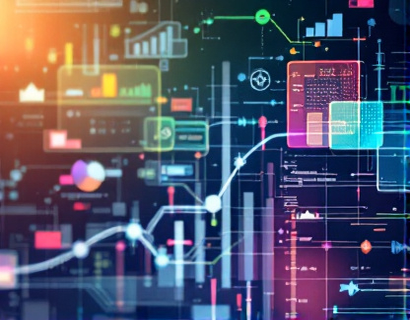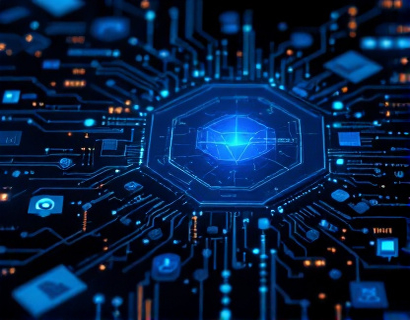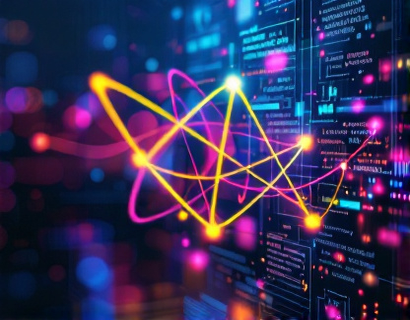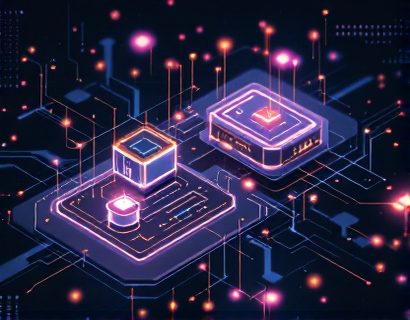Unlocking Digital Transformation: Leveraging AI and Crypto for Enhanced User Experiences
The digital landscape is undergoing a profound transformation, driven by the convergence of artificial intelligence (AI) and cryptocurrency. This fusion is not just a technological curiosity but a powerful force reshaping how we interact with digital solutions. As we stand at the forefront of this revolution, it's crucial to understand how these technologies are intertwining to create superior user experiences. This article explores the intricate ways AI and crypto are merging to unlock new potentials in digital engagement, offering insights and innovations for tech enthusiasts and early adopters.
The Intersection of AI and Cryptocurrency
At its core, the integration of AI and cryptocurrency is about harnessing the strengths of both technologies to create more secure, efficient, and personalized digital environments. AI brings intelligence, learning capabilities, and automation to the table, while cryptocurrency offers decentralization, transparency, and security. Together, they form a synergistic partnership that can redefine user interactions in the digital realm.
Enhanced Security Through Blockchain and AI
One of the most significant benefits of combining AI with cryptocurrency is the enhancement of security measures. Blockchain technology, the backbone of cryptocurrency, provides a decentralized and immutable ledger that ensures data integrity and prevents tampering. AI, with its advanced analytics and pattern recognition, can detect and mitigate threats in real-time, further fortifying the security framework. This dual approach not only protects user data but also builds trust, a critical factor in digital engagement.
For instance, AI-driven systems can monitor blockchain transactions for anomalies, identifying potential fraud or security breaches before they occur. This proactive approach to security is invaluable in an era where data breaches and cyber attacks are increasingly common. By leveraging AI to enhance blockchain security, platforms can offer users a safer and more reliable digital experience.
Personalized User Experiences with AI
AI's ability to analyze vast amounts of data and derive meaningful insights makes it an ideal tool for personalization. In the context of cryptocurrency and digital services, AI can tailor experiences to individual user preferences and behaviors. This level of customization enhances user satisfaction and engagement, as users feel that the digital solutions are designed specifically for them.
For example, AI algorithms can analyze a user's transaction history, spending habits, and preferences to recommend personalized financial products or services. In a crypto context, this could mean suggesting specific cryptocurrencies or investment strategies based on a user's risk tolerance and market trends. Such personalized recommendations not only improve user experience but also drive higher engagement and loyalty.
Decentralized Applications and AI
Decentralized applications (dApps) are a prime example of how AI and cryptocurrency are transforming digital interactions. dApps operate on blockchain networks, leveraging AI to provide intelligent and adaptive functionalities. These applications can range from decentralized finance (DeFi) platforms to smart contract-based services, all enhanced by AI-driven insights and automation.
AI can optimize the performance of dApps by predicting user behavior, managing resources efficiently, and automating complex tasks. For instance, AI can dynamically adjust the parameters of smart contracts to ensure optimal execution based on real-time data. This level of intelligence and automation not only streamlines processes but also reduces the need for intermediaries, making transactions faster and more cost-effective.
Tokenization and AI-Driven Market Insights
Tokenization, the process of converting assets into digital tokens on a blockchain, is another area where AI and cryptocurrency intersect. By tokenizing assets, platforms can offer fractional ownership and increased liquidity, making investments more accessible to a broader audience. AI plays a crucial role in this process by providing market insights and predictive analytics.
AI algorithms can analyze vast datasets to identify market trends, predict price movements, and assess risk factors. This information is invaluable for investors looking to make informed decisions. For example, AI can help identify undervalued tokens or predict the success of a new token launch based on historical data and current market conditions. Such insights empower users to navigate the crypto market with greater confidence and accuracy.
User-Centric Design and AI-Powered Interfaces
The user interface (UI) and user experience (UX) of digital platforms are critical factors in user engagement. AI enhances this aspect by enabling the creation of intuitive and adaptive interfaces. AI-powered UIs can learn from user interactions, adjusting the layout, content, and functionality to suit individual preferences and behaviors.
For instance, an AI-driven dashboard can prioritize the most relevant information and tools based on a user's activities and goals. This personalized approach not only simplifies the user experience but also increases efficiency and satisfaction. In the context of crypto and digital services, such adaptive interfaces can help users navigate complex financial instruments and market data with ease.
Chatbots and Virtual Assistants
Chatbots and virtual assistants powered by AI are becoming increasingly prevalent in digital platforms. These AI-driven agents can provide 24/7 support, answer queries, and guide users through various processes. In a crypto context, chatbots can assist users with transactions, explain complex concepts, and offer real-time market updates.
By integrating natural language processing (NLP) and machine learning, these agents can understand and respond to user queries with high accuracy and empathy. This level of interaction not only enhances user experience but also reduces the workload on human support teams, making services more scalable and efficient.
Data Privacy and AI-Enhanced Consent Management
Data privacy is a growing concern in the digital age, and the combination of AI and cryptocurrency offers innovative solutions to protect user data. Blockchain's inherent transparency and immutability, coupled with AI's advanced privacy techniques, can create robust consent management systems.
AI can help manage and automate consent processes, ensuring that users have control over their data and how it is used. For example, AI-driven platforms can dynamically adjust data sharing settings based on user preferences and regulatory requirements. This not only enhances privacy but also builds trust, a key component of user engagement.
Transparent and Fair Token Distribution
In the realm of cryptocurrency, fair and transparent token distribution is essential for maintaining user trust and ensuring the success of projects. AI can play a pivotal role in this process by analyzing distribution patterns, identifying potential issues, and suggesting improvements.
AI algorithms can monitor token sales, airdrops, and other distribution methods to ensure they align with the project's goals and community expectations. By providing transparent and fair distribution mechanisms, platforms can foster a more engaged and loyal user base.
Future Prospects and Challenges
The integration of AI and cryptocurrency holds immense potential for the future of digital interactions. However, this path is not without challenges. Regulatory hurdles, technical complexities, and user adoption are key factors that need to be addressed to fully realize the benefits of this fusion.
Regulators are still catching up with the rapid advancements in AI and cryptocurrency, leading to a patchwork of regulations that can hinder innovation. Collaboration between industry stakeholders and regulatory bodies is essential to create a conducive environment for growth. Technically, ensuring interoperability between AI systems and blockchain networks remains a significant challenge. Standardization and open protocols can help bridge this gap.
User adoption is another critical aspect. Educating users about the benefits and functionalities of AI and crypto-powered solutions is vital. Intuitive and user-friendly interfaces, along with comprehensive onboarding processes, can facilitate smoother adoption.
Conclusion
The convergence of AI and cryptocurrency is revolutionizing the digital landscape, offering unprecedented opportunities to enhance user experiences. By leveraging the strengths of both technologies, platforms can create more secure, personalized, and efficient digital environments. As we continue to navigate this exciting frontier, the key lies in addressing the challenges and fostering a collaborative ecosystem that drives innovation and growth. For those at the forefront of tech trends, the future is bright, and the possibilities are endless.











































